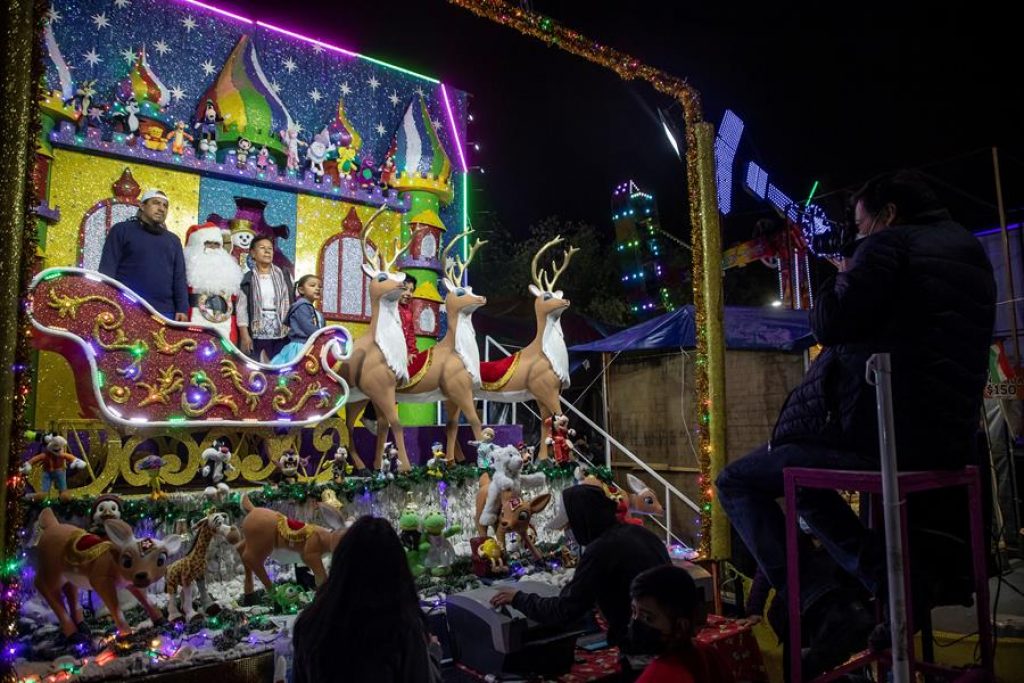The traditional posadas, one of the most popular December festivities in Mexico, returned with force in 2021 after they were reduced last year due to the confinement forced by the pandemic, and today they give hope to Mexicans despite the threat of the omicron variant of the coronavirus.
“These types of events are tradition, they have always activated the economy for everyone, for the people who are given work, hopefully, this year it will be like that and people will support us by working,” says Isabel Soto Martínez, a merchant from the City of Mexico.
Isabel is part of a festival established in the Cuauhtémoc mayor’s office, in the center of the Mexican capital, where this year they resumed the old tradition of posadas, which are celebrated for nine days starting in December 16.
For her, as for millions of Mexicans, the reactivation of this type of celebration is a respite after more than 18 months of confinement and the bad news due to the coronavirus, which in Mexico touches 4 million infections and adds 297,835 deaths.
Last year “I spent it at home, a little more boring without all these festivities of the fair, the wise men, the photo, the traditions of each year,” says Jesús, who has a private business and usually attends annually to this type of activities.
He acknowledges that 2020 was “a little more depressing” without leaving home “and all that was seen on television were tragic things of the pandemic.”
MONTH OF CELEBRATIONS
Alejandro Tovar, historian and teacher at the Tec de Monterrey Campus Santa Fe, explains to Efe that the Christmas holidays are an expression of “syncretism” since they bring together elements of native peoples “as well as Western, and even Asian culture.”.
He points out that although in Mexico there is still a historical heritage for celebrating Christmas on December 25, the festivities and December ceremonies last throughout the month.
“This is perceived with greater intensity since December 12, the day on which the Marian invocation to Our Lady of Guadalupe is commemorated and it increases from December 16, when the traditional posadas begin, ” he says.
The posadas, which arrived with the Spanish conquest, are represented by groups of people – regardless of the number – that is divided into two, one is placed outside the house and the other inside.
Those who are placed outside represent the Virgin Mary and Joseph and with Christmas carols, they ask for asylum to those of the house, who in turn also answer them with songs from this time.
This representation is carried out in this way because, according to tradition, Mary and Joseph had to go from door to door asking for an inn.
After this staging, those present at the inn break the piñata – clay pots filled with fruit and lined with colored paper – which according to tradition must have the shape of a star with 7 peaks, since each of them represents the deadly sins.
The people, one by one and the blindfolded -a fact that symbolizes faith-, try to break the piñata with a stick that in turn represents God.
The inn concludes with a party, in which the hosts offer their guests different dishes and punch, a hot drink made with seasonal fruit, such as sugar cane, apple, prunes, guavas, among others.
TRADITION OF CENTURIES
According to Tovar, the tradition of posadas has been celebrated for two centuries, although they began under the name of “aguinaldo festivities”, which were carried out with the reminder of places of the birth of the Child Jesus.
After these meetings, gifts were given to the indigenous people who attended this call for participation, who celebrated during the winter (“Panquetzaliztli”), the advent of Huitzilopochtli, the Aztec God of War.
The Augustinian religion substituted the image of Huitzilopochtli for that of Joseph and Mary.
During these posadas days, many of the streets of Mexico display colorful lanterns and all kinds of decorations alluding to Christmas.
To enjoy an inn again is a respite for Isabel, after having lost three family members to the pandemic, but also a hope that the pandemic will end soon.
“I hope that above all they have health because without health we can do nothing. That this is over as soon as possible,” he concludes.
